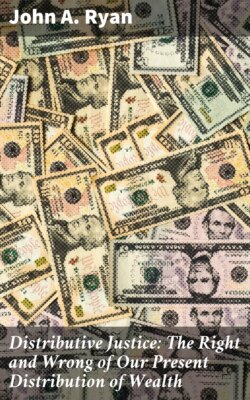Читать книгу Distributive Justice: The Right and Wrong of Our Present Distribution of Wealth - John A. Ryan - Страница 30
На сайте Литреса книга снята с продажи.
The Doctrine of the Fathers and Theologians
ОглавлениеTable of Contents
Some of the Church Fathers, particularly Augustine, Ambrose, Basil, Chrysostom, and Jerome, denounced riches and the rich so severely that they have been accused of denying the right of private ownership. The facts, however, are that none of the passages upon which this accusation is based proves it to be true, and that in numerous other passages all of these writers explicitly affirm that private ownership is lawful.[38] Speaking generally, we may say that they taught the moral goodness of private ownership without insisting upon its necessity. Hence they cannot be cited as authorities for the doctrine that the individual has a natural right to own land.
Some of the great theologians of mediæval and post-mediæval times denied this right, inasmuch as they denied that the institution of private ownership was imposed or commanded by the natural law. Among them are Scotus,[39] Molina,[40] Lessius,[41] Suarez,[42] Vasquez,[43] and Billuart.[44] Since private ownership is not absolutely necessary to human welfare in all forms of society, it cannot, in their view, be regarded as strictly prescribed by the natural law, nor be instituted without the positive action of civil authority, or the consent of the community. Nevertheless they all admit that it is much better than common ownership in contemporary societies. The difference between their position and that of de Lugo, for example, seems to be two-fold: First, they put stronger emphasis upon the doctrines that the earth belongs to all men in common, that in the absence of original sin ownership would likewise have been common, and that this arrangement is therefore in a fundamental sense normal, agreeing with nature and the natural law; and, second, they put a lower estimate upon the superiority of private ownership even in contemporary conditions. In a word, they denied that private ownership was so much better than any alternative system as to confer upon the individual a natural right in the strict sense; that is, a right which laid upon the State the correlative obligation of maintaining the institution of private landownership.
On the other hand, many of the ablest theologians of the same period declared that private ownership was enjoined by the natural law and right reason, and consequently that it was among the individual's natural rights. According to St. Thomas Aquinas, private property is "necessary for human life," and is one of those social institutions which are prescribed by the jus gentium; and the content of the jus gentium is not determined by positive law, but by the dictates of "natural reason," by "natural reason itself."[45] These statements seem to convey the doctrine of natural right as clearly as could be expected in the absence of an explicit declaration. Cardinal de Lugo sets forth the same teaching somewhat more compactly, but in substantially the same terms: "Speaking generally, a division of goods and of ownership-titles proceeds from the law of nature, for natural reason dictates such division as necessary in the present circumstances of fallen nature and dense populations."[46] This view is to-day universally accepted among Catholic writers.
